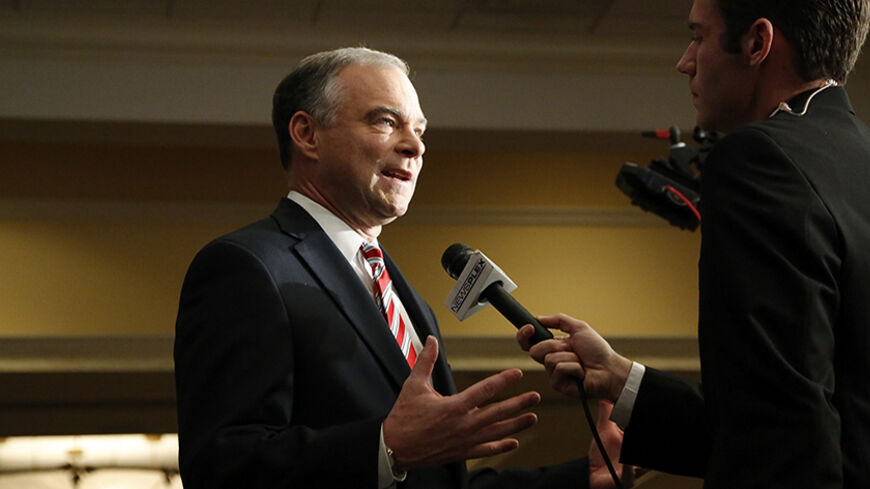Calls for Congress to authorize even limited military action in Iraq heated up Wednesday as a leading Democrat on the Senate Foreign Relations Committee demanded that lawmakers have a say before the United States uses force in Iraq.
In a biting Washington Post op-ed followed by a lengthy floor speech on June 25, Sen. Tim Kaine, D-Va., argued that President Barack Obama "must" come to Congress before launching airstrikes or taking other military action.
The strong message from the chairman of the Foreign Relations subcommittee on Near Eastern and South and Central Asian affairs suggests support for unilateral executive action may be fraying as Baghdad itself no longer appears in imminent danger of falling as it did last week.
"I do not believe that this president — or any president — has the ability, without congressional approval, to initiate military action in Iraq or anywhere else, except in the case of an emergency posing an imminent threat to the US or its citizens," Kaine said on the Senate floor. "And I also assert that the current crisis in Iraq, while serious and posing the possibility of a long-term threat to the United States, is not the kind of conflict where the president can or should act unilaterally. If the United States is to contemplate military action in Iraq, the president must seek congressional authorization."
A number of lawmakers share that view. Even hawks like Sen. James Inhofe, R-Okla., the top Republican on the Senate Armed Services Committee, and Sen. Mark Kirk, R-Ill., have urged Obama to seek congressional authorization to go after the Islamic State of Iraq and al-Sham (ISIS) — even as they worry Congress will vote against military action, judging by the lack of support for airstrikes against Bashar al-Assad's regime in Syria last year.
"I'm always in favor of having a political context. I think the US Congress should approve limited airstrikes to make sure terrorists don't take over Iraq," Kirk told reporters last week. "I think Congress might drop the ball on that, as they're so skittish about further military action."
Potential Libertarian presidential candidate Rand Paul, R-Ky., also wants Congress to vote, and several others agree — providing there's no immediate threat, in particular to the large number of US diplomats who remain in the country.
"If there's going to be a prolonged military conflict, the president should come to Congress and seek authorization to engage," Sen. Ted Cruz, R-Texas, a potential Tea Party candidate for president in 2016, told Al-Monitor. "The question of whether a threat is imminent depends on the specific factors on the ground, so absent real-time intelligence one cannot answer that question in the abstract."
Kaine's position, however, puts him squarely at odds with powerful senators of his own party.
"I appreciate that's Sen. Kaine's view. It all depends upon the nature of what the president intends to do, the scope of it, the duration of it," Senate Foreign Relations Chairman Robert Menendez, D-N.J., told Al-Monitor. "I think there's a threat by ISIS, and the question is, do you let the threat grow in such a way that what you'll have to do is far more robust, versus doing something now that's far more limited and can be far more consequential."
Sen. Barbara Boxer, D-Calif., a senior member of the committee, said the 2001 counterterrorism Authorization for Use of Military Force (AUMF) does allow for airstrikes inside Iraq.
"ISIS is an outgrowth of al-Qaeda; that's covered," Boxer told Al-Monitor. "The mission is counterterrorism. I voted for that."
The debate in Congress comes as Iraq is asking the United Nations for military equipment and logistical help to combat ISIS. The UN's special envoy to Iraq on June 25 called for a military plan to combat ISIS but warned that any solution to the crisis must be backed by political reconciliation.
“We have consistently urged for the need for national dialogue, for unity, and, very importantly, for the full participation of the Sunni community in the political process, without whom that process will not be complete,” Nickolay Mladenov told reporters via video from Baghdad.



